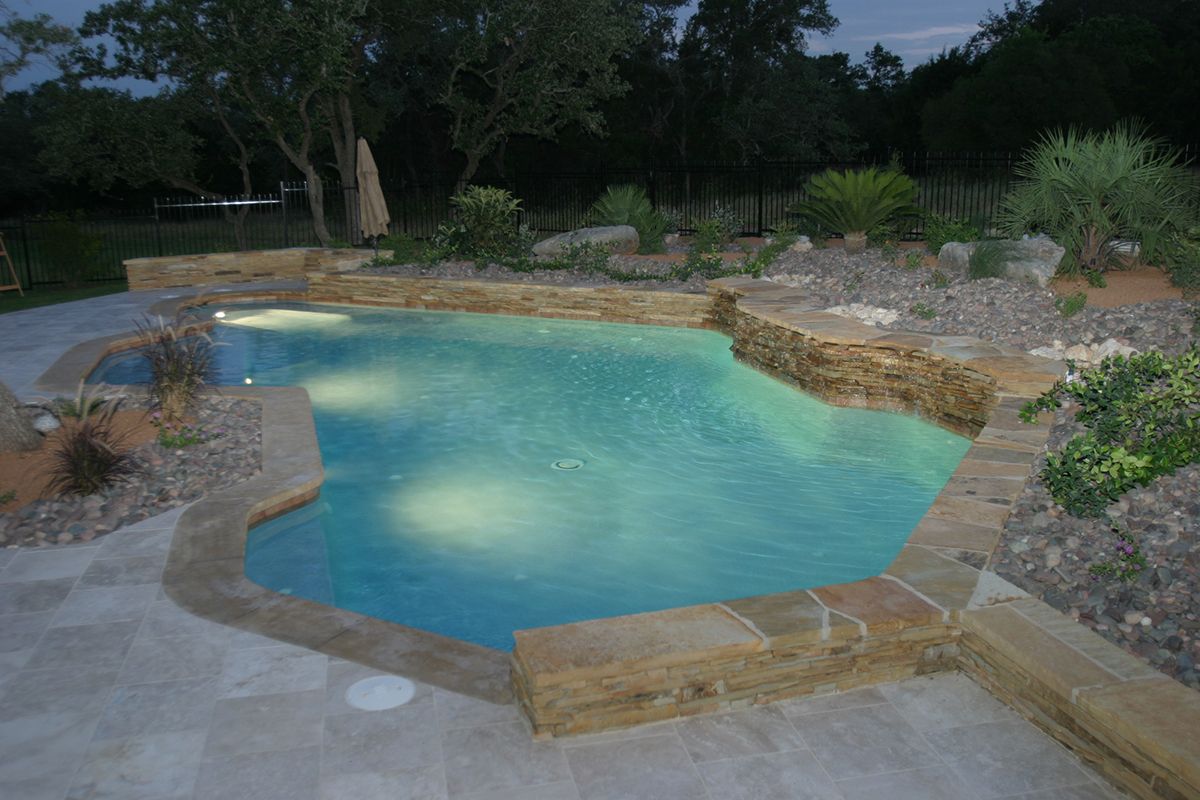
Saltwater vs. Chlorine Pools: What’s Best for Texas Homes?
When you’re deciding on the best type of pool for your Texas home, one of the main choices you’ll face is whether to go with a traditional chlorine pool or a saltwater pool. Each system has its unique benefits and considerations, especially in Austin, TX, where long, hot summers and mild winters mean pools get plenty of use year-round.
Let's explore the ins and outs of both types, so you can decide which is the best fit for your lifestyle, budget, and maintenance preferences.
The Basics: How Do Saltwater and Chlorine Pools Work?
Chlorine Pools: In a chlorine pool, chlorine is manually added to the water through tablets, granules, or liquid to kill bacteria and algae. Regular additions and testing are necessary to maintain an ideal chlorine level, which keeps the water clean and safe to swim in.
Saltwater Pools: Saltwater pools still use chlorine, but instead of manually adding chlorine, the pool relies on a salt chlorine generator. This device converts salt into chlorine at a steady rate, meaning you don't need to add chlorine manually as frequently. Salt is added to the pool water initially and as needed, with the generator maintaining a consistent chlorine level.
Benefits of Saltwater Pools for Texas Homes
Saltwater pools have gained popularity for a reason: they’re known for their soft water feel and low-maintenance convenience. Here’s why they’re particularly appealing in the Texas climate:
Gentler on Skin and Eyes
Saltwater pools have lower chlorine concentrations than traditional pools, resulting in a more comfortable swimming experience. This can be especially beneficial if you or your family members have sensitive skin or allergies. The milder chlorine levels are less likely to irritate the skin and eyes, making saltwater a great choice if your pool gets a lot of use.
Low-Maintenance Chlorine Generation
A saltwater pool’s generator continuously produces chlorine, keeping the pool balanced with less frequent manual testing. In Texas, where hot temperatures can rapidly consume chlorine in traditional pools, this steady supply can help prevent fluctuations, reducing the need for weekly additions and adjustments.
Cost Savings Over Time
While a saltwater system has a higher initial cost due to the need for a chlorine generator, it often saves money in the long run. With less need to buy chlorine and lower maintenance requirements, saltwater pools can be more economical for homeowners who plan to use their pool heavily.
Softer Water Experience
Swimming in a saltwater pool provides a more natural, softer feel to the water. It’s not ocean water salty but adds a slight buoyancy and silky texture that many people prefer. This added comfort makes saltwater pools a preferred option for relaxation and long swim sessions.
Benefits of Chlorine Pools for Texas Homes
Chlorine pools are the traditional option and continue to be popular for their reliability, affordability, and effectiveness. Here’s why chlorine pools are still a top choice in Texas:
Lower Initial Cost
Compared to a saltwater system, installing a chlorine pool generally costs less upfront. You won’t need a chlorine generator, which is one of the biggest expenses for saltwater pools. If you're working within a budget, this might make a chlorine pool the more attractive option.
Effective Sanitization
Chlorine pools are highly effective at killing bacteria and algae. With Texas's warm climate and frequent pool use, chlorine’s quick sanitization properties keep your pool consistently clean and safe, especially after heavy usage.
Easier Repairs and Part Replacement
Chlorine systems are generally less complex than saltwater systems, so when repairs are needed, they’re often simpler and less expensive. In saltwater pools, the chlorine generator may need replacing every few years, which can be costly. With a chlorine pool, repairs typically involve simpler fixes to basic parts, which can be helpful in the long run.
Chemical Control and Flexibility
Chlorine pools allow you to adjust the amount of chlorine manually, giving you direct control over the pool’s chemical balance. This can be useful in extreme weather conditions or after a heavy rainstorm, where quickly adjusting chlorine levels may be needed. While saltwater pools adjust automatically, a chlorine pool gives you the flexibility to make immediate changes based on your needs.
Important Considerations for Texas Pool Owners
Temperature and Climate Impact: Texas summers can cause chlorine to evaporate faster, meaning that chlorine pools often require more frequent chlorine additions. In a saltwater pool, the generator can help to maintain levels during hot periods, reducing the frequency of adjustments.
Potential Corrosion: Saltwater can be corrosive over time, especially to metal components in and around your pool. If you choose a saltwater pool, consider using materials like resin and plastic for pool equipment or applying protective coatings to metal surfaces. Chlorine pools don’t pose the same corrosion risk, making them better for pools with more metal fixtures or those close to metal patio furniture.
Maintenance Preferences: If you prefer a hands-on approach, a chlorine pool gives you more frequent opportunities to check and balance the chemicals. For those who want a lower-maintenance pool, a saltwater pool could be ideal, as the generator automates much of the sanitization process.
Budgeting for Upkeep: While chlorine is an ongoing cost for traditional pools, saltwater pools require occasional generator maintenance and salt additions, which can add up. Take into account your annual budget for pool upkeep to see which system aligns with your financial goals.
Making the Right Choice for Your Texas Pool
Both saltwater and chlorine pools are excellent options, but the best choice depends on your personal preferences, lifestyle, and budget. If you’re looking for a pool with a softer feel, lower maintenance, and long-term cost savings, a saltwater pool may be the way to go. However, if you prefer a more straightforward system with lower upfront costs and easier repairs, a chlorine pool might be more suitable.
For a Texas homeowner, either option can work well – it’s simply a matter of choosing what aligns best with your maintenance style, comfort preferences, and budget. If you’re still unsure which option is right for you, consulting with local pool contractors in Pflugerville, TX can provide valuable insights based on the unique needs of your property and the climate in Georgetown, TX.
By making an informed choice, you can enjoy your pool for years to come, ensuring it’s both a refreshing escape during the hot summers and a feature that adds lasting value to your home.
